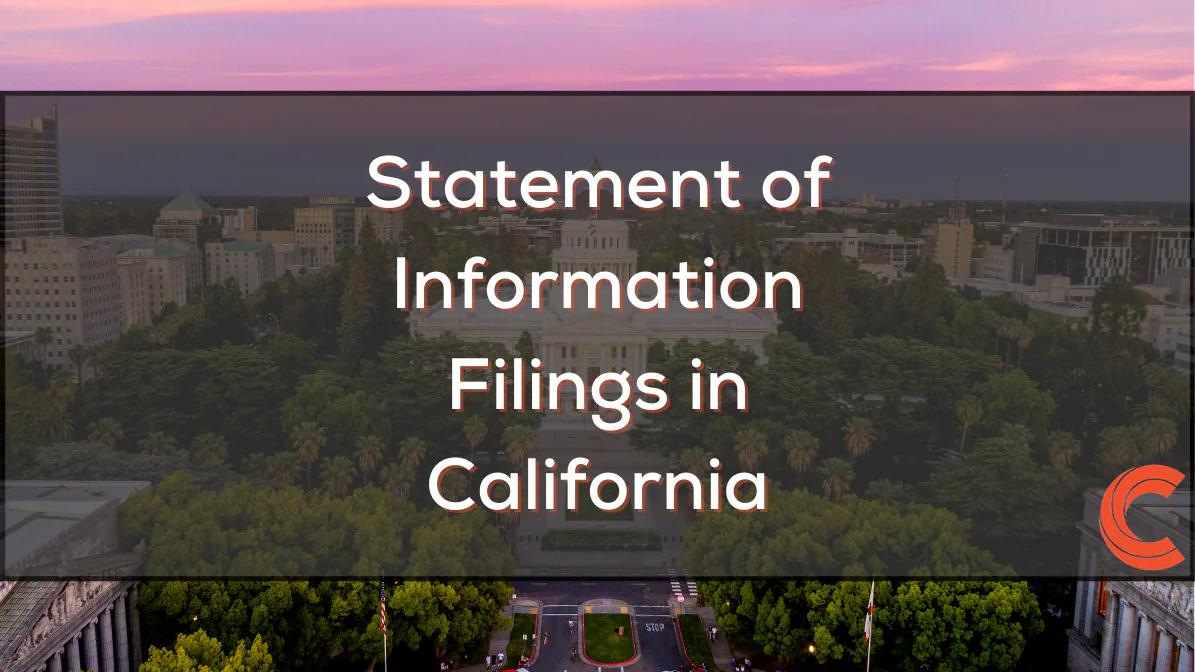For businesses operating in California, staying compliant with state regulations is essential. One crucial requirement for many business entities is filing a Statement of Information (SI) with the California Secretary of State. This blog post dives into the details of SI filings, helping you understand what they are, who needs to file them, and how to ensure a smooth filing process.
What is a Statement of Information (SI)?
Think of a Statement of Information as an update to the state about your business. It provides essential details about your company structure and ownership, ensuring the California Secretary of State has accurate records. It’s similar to an annual report but focused on specific entity information.
Who Needs to File a Statement of Information?
Not all California businesses need to file an SI. Here’s a breakdown of the entities required to file:
- Corporations: All for-profit and non-profit corporations registered in California must file an SI.
- Limited Liability Companies (LLCs): All LLCs registered in California must file an SI.
- Limited Partnerships (LPs): California requires LPs to file an SI.
When are SI Filings Due?
The filing deadline for your SI depends on the type of entity you have:
- Corporations: Corporations generally file their SI during a six-month window based on their original filing date. The exact window is detailed on the Secretary of State’s website.
- LLCs: LLCs file their SI every two years during a six-month window based on their original filing date. You can find the specific window on the Secretary of State’s website.
- LPs: Limited Partnerships file their SI every five years during the calendar year ending on the anniversary of their formation.
What Information is Included in an SI Filing?
A typical Statement of Information filing includes the following details:
- Business Name and Entity Type: This identifies your business by its legal name and clarifies if it’s a corporation, LLC, or LP.
- Registered Agent Information: The SI identifies your registered agent, the individual or service that receives legal documents on your company’s behalf.
- Mailing Address: This ensures the Secretary of State has your up-to-date business mailing address.
- Officer and Director Information for Corporations: Corporations must list the names and residential addresses of their officers and directors.
- Manager and Member Information for LLCs: LLCs must identify their managers and members (owners).
How to File a Statement of Information
There are three ways to file your SI in California:
- Online Filing: The California Secretary of State offers a convenient online filing system for SIs. This is generally the fastest and easiest method.
- Mail-in Filing: You can download and complete a paper SI form and mail it to the Secretary of State’s office.
- In-person Filing: You can also file your SI in person at the Secretary of State’s office in Sacramento.
Tips for a Smooth SI Filing Process
Here are some helpful tips for a smooth SI filing experience:
- Mark Your Calendar: Set a reminder for your SI filing deadline well in advance to avoid any last-minute stress.
- Gather Information: Ensure you have all the necessary information readily available before starting the filing process.
- File Electronically: Online filing is the most efficient and recommended method. It’s faster, reduces errors, and offers immediate confirmation.
- Review for Accuracy: Carefully review your SI filing before submission to ensure all information is accurate and complete.
What Happens if I Miss the SI Filing Deadline?
Missing the SI filing deadline can result in penalties and potential suspension of your business entity. It’s crucial to file your SI on time to avoid these consequences.
Seeking Help with SI Filings
While filing an SI is generally straightforward, navigating legal matters can sometimes be complex. Here’s how Carbon Law Group can assist you:
- Filing Assistance: We can guide you through the SI filing process, ensuring you file the correct form and meet all deadlines.
- Compliance Management: Carbon Law Group can help you develop a system for managing your business compliance requirements, including SIs and other filings.
- Legal Expertise: Our experienced attorneys can answer your questions and address any legal concerns you may have regarding SI filings.
Conclusion
By understanding the requirements and following these tips, you can streamline your Statement of Information filings in California. Filing your SI on time ensures your business remains compliant with state regulations and avoids potential penalties. If you have any questions or require assistance with the filing process, don’t hesitate to contact Carbon Law Group. Our team is here to help you navigate the legal complexities of running a business in California and ensure your company stays compliant with all regulations.
Additional Resources
For further information on Statement of Information filings and California business compliance, consider these resources:
- California Secretary of State – Business Programs Division: https://bizfileonline.sos.ca.gov/search
- California Business Portal: https://businessportal.ca.gov/
- Franchise Tax Board (FTB): https://www.ftb.ca.gov/
By staying informed and seeking professional guidance when needed, you can ensure your California business thrives while maintaining good legal standing.





